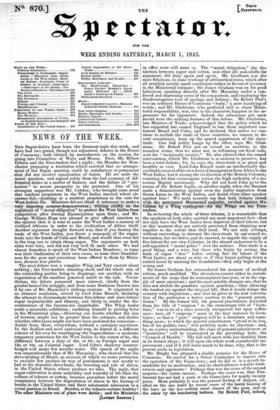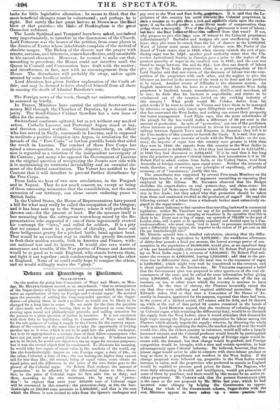NEWS OF THE WEEK.
THE Sugar-duties have been the foremost topic this week, and have had two grand, though not adjourned, debates in the House of Commons ; -both elicited by amendments on the motion for going into Committee of Ways and Means. First, Mr. Milner Gibson and the Free-traders had a night ; the Member for Man- chester proposing a resolution which asserted that no arrange- ment of the• Sugar question could be satisfactory or permanent -that . did not' involve equalization of duties. He set aside the 'moral question, and argued solely from the bad economy of dif-. ferentia duties as a matter of finance., and the failure of " pro- : tection " to Secure prosperity to the protected. One of his .strongest supporters .Was Mr. Cobden; who brought some proof . that resident proprietors in the West Indies succeed where ' ab- sentees fail,—pointing at a resident proprietary as the cure for West Indian Ministers did not think it necessary to make a . very imposing counter-demonstration ; 'relying chiefly on the argument of "moral obligation" to protect the West Indies from competition after forcing Emancipation upon them ; and Mr.- George William .Hope was pleased to give official " sanction. to the opinion that it is Wise to make the West Indies a nursery' of - civilized Africans in- to the civilization of Africa itself. - Another argument bought forward was, that if you destroy the _ trade of the West Indies, you throw a: monopoly Of the sugar-- trade into the hinds of Cuba and Brazil, and would thus even fail
, -
in the long run to attain cheap sugar. The arguments on both- -. „sides were trite, and -did not very well fit each other. We had
almost -forgotten to speak of the West Indian Members ; so tame - was their 'vindication of their own cause, so tame their thankful- - nese for the poor and precarious boon offered to them by Minis- ': ters Amide bane pie cite.
The next debate was a complete Whig and Tory contest about nothing ; the Free-traders . standing aloof, and the whole aim of the contending parties being to disparage one another, with no expectation of the smallest practical result to the talk. Never- theless, the debate-. possessed more interest, chiefly from the freider heatof the struggle, and from some freshness thrown into it by one-of Mr. 1Vlacaulay's striking orations. It originated in an abstract resolution, moved by Lord John Russell, declaring the attempt to discriminatebetween free-labour and slave-labour sugar impracticable and illusory,:and likely to render the dis- continuance Of the Inc-mile-tax improbable. The Whig leader made a:miserablo exhibition; confining himself to picking holes in the Ministerial 'plan,—throwing out doubts whether the loss of revenue Might not be greater than the estimate, and doubts - whether other taxes might not have been preferred for remission- ' doubts here,- there, everywhere, without a certainty anywhere. In the feeblest and most equivocal way, he hinted at a different • .scherne of his own for rearranging the Sugar-duties--a moderate _ tenaporary protection for the West Indies to the extent of 8.s., the difference between a' duty of 20s. or 18.s. 'on Foreign sugar and -. 12s. or 10s. on Colonial sugar. Lord John's Shadowy counter- budget will Make few niouths water. The speech of the night was un:questiOnably that of Mr. Macaulay; who showed that the slave-trading-of Brazil, on accOunt of which we make pretension to exclude her produce by way of punishment, is not nearly so bad as the domestic slave-trade, the -breeding and sale of slaves, in the United. States, *hose produce we take. The reply, that sugar cultivation is more unhealthy and wasteful of life than the culture of tobacco or cotton, becomes powerless. before the moral comparison between the degradation of slaves to the footing of brutes_in the United States .and their substantial, admission to a social-position in Brazil. Besides, is the tobacco-culture healthy? The other Ministers' out of place were feeble ; and the Ministers in office were still more so. The " moral obligation," the dis- tinction between sugar and cotton, and other old makeshifts for argument, did duty again and again. Mr. Groulburn was the most felicitous, in some working of arithmetical sums, which after all establish merely small conclusions rather in favour of accuracy in the Ministerial estimate ; Sir James Graham was on his good behaviour, speaking directly after Mr. Macaulay under a con- fessed and depressing sense of the comparison, and employing the disadvantageous tone of apology and defence ; Sir Robert Peel's was an ordinary House of Commons "reply," a mere bandying of words ; and Mr. Gladstone, who professed still to share Minis- terial responsibility, was, true to his character, happiest in the ar- guments for his opponents. Indeed, the admissions put upon record were the striking features of this debate. Mr. Gladstone, late Minister of Trade, acknowledged that the policy which he has supported has caused England to lose those important cus- tomers Brazil and Cuba; and he declared, that unless we CP11— tinue to exclude the trade of those countries, we cannot, in de- cent consistency, keep up the armed suppression of the slave- trade. One bad policy hangs by the other, says Mr. Glad- stone. Sir Robert Peel put on record an assertion, in the roundest terms, that we must not, in reforming our fiscal code, wait for "reciprocity treaties." He also allowed that the armed intervention, which Mr. Gladstone is so anxious to preserve, has been a total failure - for he says, the slave-trade is as great and horrible as ever. failure; Russell made an intellectually dis- creditable avowal of his own fears of immigration from Africa to the West Indies, lest it swamp the civilization of the British Colonies; vaunting for that extravagant notion the high authority of a no- torious Baptist missionary. Why did not Lord John go to the rescue of Sir Robert Inglis, on another night, when the Baronet made a demonstration against even the paltry migration from Sierra Leone to the West Indies and found every other speaker against him ? We need scarcely say that both debates closed. with the anticipated Ministerial majority, swelled against Mr. Gibtion by a Whig contingent—.for the Whigs are not Free- traders.
In reviewing the whole of these debates, it is remarkable that the speakers on both sides omitted one most important fact—that not only have the West Indies been deprived of their labour,. but at this monient they are actively prevented from obtaining new supplies to the extent that they need. We not only attempt, without succeeding, to obstruct the slave-trade by our armed in- tervention, but we strive, and do succeed, to impede the supply of free-labour for our own Colonies, in the absurd endeavourto be a self-appointed "moral police" over the nations. Free trade is a good thing, and a wise; but those who begin by setting the trade of sugar " free" before setting free the labour of the West Indies, are about as wise as if they began pulling down a. ruined house by undoing the foundation—they only begin at the wrong end.
Sir James Graham has reintroduced his measure of medical reform, much modified. The alterations consist 'either in curtail- ments of the scope that he contemplated last year, or in the sup- ply of mere omissions ; and the most notable changes are, that he does not abolish the penalties against quackery,—thus silencing the loudest cry against the original bill, that it would deluge the country with empiricism ; and that he gives in the new constitu- tion of the profession a better position to the "general practi- tioner." By the former bill, the general practitioner, degraded from his title of " surgeon " to the tramontane title of 'licen- tiate," was to be of a class scarcely recognized but upon suffer-. ance : now, all " surgeons " must in the first instance be licen- tiates; so that a " pure " surgeon will be a licentiate and some- thing more ; to which the general practitioner, "proud to be less, but of his godlike race," will probably make no objection : and, by an express understanding, the class of general practitioners or " licentiates " will be represented in the governing body, the "Council of Health." The bill will meet with less hostility than in its former shape.- it will upon the whole work considerable im- provement; and if it still leave much to be done, why, that is the present mode in legislation. Mr. Bright has prepared a double surprise for the House of Commons. He moved for a Select Committee to inquire into the operation of the Game-laws ; and he did so in a speech re- markable for its moderation, and its charitableness towards land- owners and opponents 1 Perhaps that was the cause of the second surprise—his entire success. Perhaps the cause was, that Par- liament has not had a peck at the Game-laws for nearly twenty years. More probably it was the general feeling of disgust, "ex- cited on' the one hand by recent cases of the harsh bearing of the laws on the less orderly rural classes of the poor, and on the other by the butchering battues. Sir Robert Peel, indeed, looks for little legislative alteration : he seems to think that the most beneficial changes must be volunteered ; and perhaps he is right. But surely,the last great 7battue,a,t Stowe was the final blow at that practice : the Duke of Buokingham is the peat Game-law reformer.
The Lords Spititualaml Temporal havebeen askedoot inieed very importunately, to interfere in the dissensions of the Church. Lord Fortescue was the bearer of the petition, from some places in the diocese of Exeter whose inhabitants complain of the revival of obsolete usages. The Bishop of the diocese met the prayer with retorts, sarcasm, and bitterness, somewhat effective, only unsuitable to his sacred character. However, he seemed to make out that, -according to precedent, the House could not interfere until the Queen in Council and Convocation have dealt with the matter ; and interference, in fact, met with no encouragement from the House. The disturbance will probably die away, unless again aroused by some heedless zealot.
Lord Aberdeen has given further explanation of the Corfu af- fair ; and may be deemed to have absolved himself from all share in causing the death of Admiral Bandiera's sons.



























